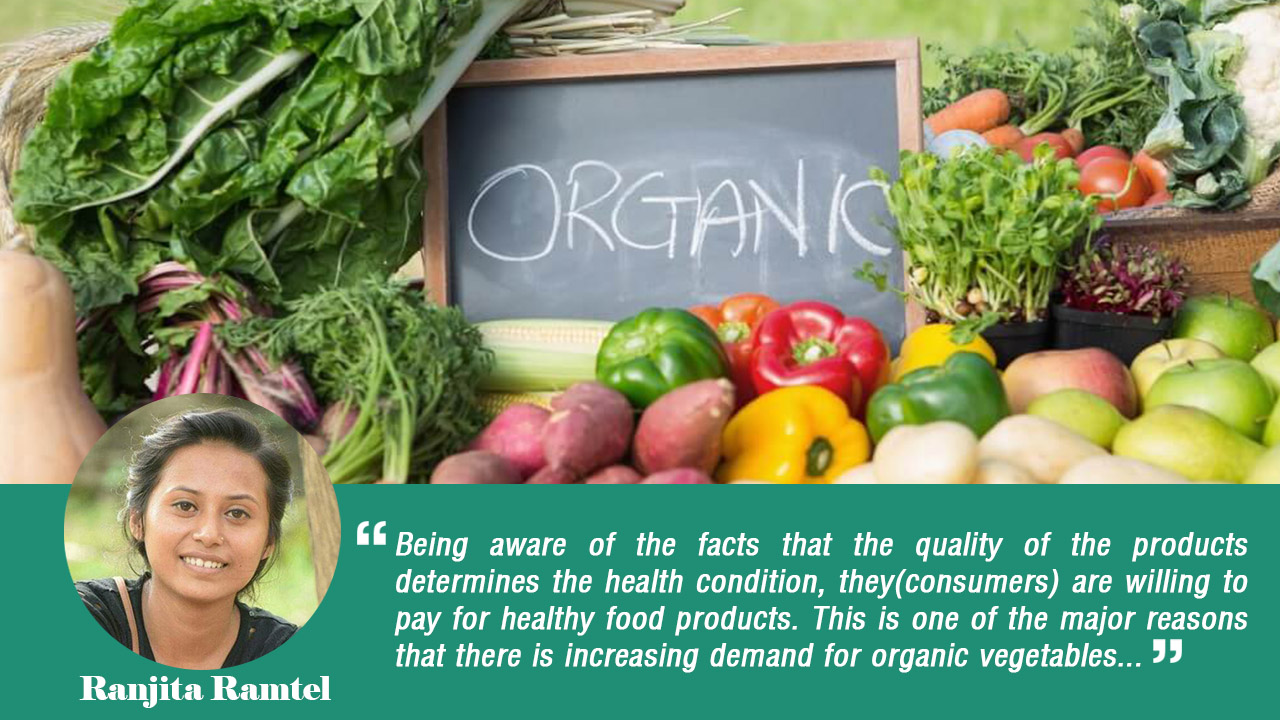
Organic farming can be defined as a form of agriculture which does not use chemical inputs in its production process and enhance biological and ecological process to promote soil fertility and good health of plants and animals. It is gaining momentum in Nepal. Organic foods are slowly getting bigger in terms of followers and producers In Nepal. Nepalese, esp. people of urban area are more concerned about what they eat and how they are produced or prepared. Being aware of the facts that the quality of the products determines the health condition, they are willing to pay for healthy food products. This is one of the major reasons that there is increasing demand for organic vegetables esp. in urban areas and flourishment of organic farming in the country.
In the present context, the inability of traditionally produced foods to meet day to day needs of the growing population, Government has been importing from different counties to meet these needs. Similarly, farmers are using excessive chemicals to increase the production. Most of the farmers do not know about the practices of organic farming. Organic agriculture has both opportunities as well as challenges in our country.
OPPORTUNITIES:
- It is cost effective as no expense is required for chemical fertilizers, pesticides, and other livestock feed additives.
- It fetches higher price than other inorganic crops and vegetables. So, profit margin is higher due to low cost of production and higher market price
- Nepal is known as microclimate museum that’s why it is possible to produce different types of vegetables at same time
- Biodiversity conservation, environmentally safe and production of healthy foods
- Demand of organic products is gradually increasing due to increase in education and awareness about health, purchasing power, and willingness to pay for healthy food among consumers’
- Food security due to sustainable improvement in soil fertility and productivity
- Export potential of high quality organic products like lentils, cardamom, tea, Amala, coffee, etc.
- Gradual improvement in physical infrastructures, development of organic institutions like farmers’ groups, cooperatives, commercial farms, research centre, certifying agency, accreditation body, and extension offices at local, provincial and central level.
CHALLENGES:
Organic farming has its own shortcomings in Nepal. Some challenges at producer’s and marketer’s level are:
- Producer’s level:
- Poor technical skills and mostly labour intensive farming
- Problem in managing large complex farm land
- Insufficient organic technology to support production
- Lack of research on processing and certification
- Poor investment capacity
- Small and fragmented land holding
- Less risk bearing capacity of farmers
- Marketer’s level:
- Poor consumer’s awareness about organic products quality and availability
- Lack of trust authenticity of the products
- Higher price
- Lack of market and market infrastructures
Some other challenges are listed as follows:
- Poor relation between research and extension system. Research works on processing and certification of products is weak
- It takes about 3 years to convert conventional farm to organic farm which is a very long time
- Lack of accredited laboratories
- There is virtual lack of government support to organic grower and marketers
- Emphasis on organic agriculture at policy and programme level looks inadequate for its development and promotion
Organic agriculture as an Opportunity in scenario of Corona:
During this nationwide lockdown due to Corona, when people are at home, they can this time as an opportunity of the initiation of organic agriculture from individual family level. As there is no availability of chemical fertilizers and pesticides, we can make vermicompost from our household wastes. Different innovative farming like rooftop gardening, backyard gardening, etc. can be done. Similarly, cultivation methods by utilizing empty plastic bottles, pots, buckets, and empty bags can also be done with the help of all the family members of a family. We can initiate doing organic agriculture from our own farmland during this lockdown. We can produce the healthy foods which help to build our immune system in this pandemic. By adopting this during this leisure time, we can produce the foods for our family instead of buying unhealthy foods from markets. Hence, this lockdown havoc of Covid-19 can be taken as an opportunity for initiation of organic agriculture by using available resources and family manpower from individual households.
Writer: Ranjita Ramtel ( Institute of Agriculture and Animal Science, Paklihawa (6th sem)









